|
|
|
Sort Order |
|
|
|
Items / Page
|
|
|
|
|
|
|
| Srl | Item |
| 1 |
ID:
136054
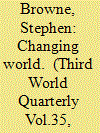

|
|
|
|
|
| Summary/Abstract |
This article examines five contemporary areas of development concern that have become major drivers of global transformation since the turn of the millennium: the plight of fragile states; the emergence of new powers and new development funds in a changing aid landscape; the need for developing countries to manage the growing resources at their disposal; encroachments on the political sovereignty of states; and new global challenges that demand global action, including climate change, migration, and food security. These drivers of change call for responses from the UN – and in particular its development system of some 30 organisations. The ongoing protracted debate on the future UN development agenda should take cognisance of these changes if the system is to remain relevant after 2015. But the signs are not promising that either the agenda or the UN development system are up to the task.
|
|
|
|
|
|
|
|
|
|
|
|
|
|
|
|
| 2 |
ID:
136058
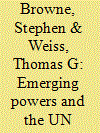

|
|
|
|
|
| Summary/Abstract |
The importance of emerging powers in the UN development system is undeniable, but their influence over the shape of the post-2015 agenda is less clear. This article examines recent survey data by the Future UN Development System (funds) Project in order to better gauge the perceptions of the problems and prospects.
|
|
|
|
|
|
|
|
|
|
|
|
|
|
|
|
| 3 |
ID:
136056
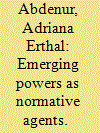

|
|
|
|
|
| Summary/Abstract |
Institutions are frequently thought of as ‘socialising’ member states into pre-established norms. However, this influence is not necessarily a one-way street; members can also affect institutions, whether individually or collectively. This article analyses the behaviour of two emerging powers – Brazil and China – within the field of international development. What roles have these two states played in shaping global development norms? The article examines the key motivations, positions, and initiatives taken by Brazil and China, with special reference to the UN development system (unds). Whereas Brazil and China’s early behaviour within the unds diverged significantly, in the post-cold war period both have become increasingly interested in – and capable of – influencing UN norms. However, despite greater involvement in UN development negotiations, these countries’ leverage in normative debates originates outside of the unds, through their South–South cooperation programmes. The current diversification of platforms through which the norms of international development are negotiated may enhance the influence of emerging powers, although their ability to channel this influence effectively will depend on their capacity for norm entrepreneurship, rather than mere norm blocking.
|
|
|
|
|
|
|
|
|
|
|
|
|
|
|
|
| 4 |
ID:
136053
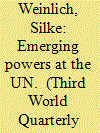

|
|
|
|
|
| Summary/Abstract |
The economic rise of China, India, South Africa, and Brazil has turned these countries into important providers of development assistance. While they seem increasingly comfortable in their bilateral relations with other developing countries, they are struggling to adapt their position within global institutions such as the United Nations. Do they turn their increased weight into a greater influence at the UN, and if not, why not? This article analyses financial contributions and political positioning at the UN in the area of development. Despite small changes, the four countries mostly insist on keeping their traditional status as recipients and ‘ordinary’ developing countries. This reservation can be explained in two ways: first, a more explicit leadership creates political and material costs that outweigh the potential benefits. Second, their shared experiences as developing countries make it hard to break ranks at the UN.
|
|
|
|
|
|
|
|
|
|
|
|
|
|
|
|
| 5 |
ID:
136052
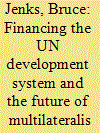

|
|
|
|
|
| Summary/Abstract |
This article seeks to accomplish four tasks. It explores the historical relationship between the financing instruments that dominated different phases of the evolution of the UN development system and the understanding of the concept of multilateralism. Bearing in mind this historical context, it seeks to analyse the defining characteristics of multilateral finance in the context of the UN, in particular the characteristics that make a financial instrument more or less multilateral. It then explores a number of new financial instruments and their possible impact on the future shape multilateralism takes in the UN system. The article concludes with some thoughts on financing for a new multilateralism. In order to go beyond the core/non-core stalemate, it is necessary to develop a new variable geometry based on function, which brings into play assessed, negotiated pledges, voluntary core and non-core instruments.
|
|
|
|
|
|
|
|
|
|
|
|
|
|
|
|
| 6 |
ID:
136059
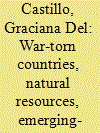

|
|
|
|
|
| Summary/Abstract |
The unsustainable aid dependency of war-torn countries – most of which are rich in natural resources – makes it imperative to start gradually replacing aid with foreign direct investment (fdi) and exports. This article identifies ways in which stakeholders – governments, the international community, including the UN development system, foreign investors, and local communities – could work together in a ‘win-win’ situation. Most crucial is avoiding conflict-insensitive policies that fuel discord by putting governments and foreign companies, often from emerging markets, in direct confrontation with local communities. The control of natural resources is often a root cause of conflict, and the latter’s exploitation can become a major challenge as wars end. The peculiarities of war-torn countries are discussed along with the specific impediments to attracting fdi into the exploitation of natural resources. An effective and fair legal framework is necessary to ensure that investors do not operate as ‘enclaves’, creating new conflicts.
|
|
|
|
|
|
|
|
|
|
|
|
|
|
|
|
|
|
|
|
|